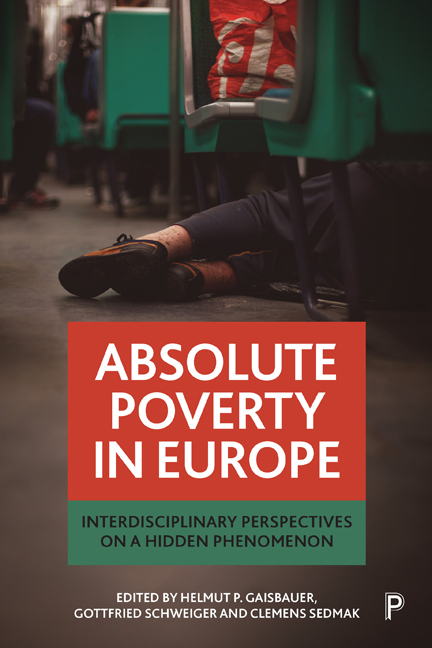Book contents
- Frontmatter
- Contents
- List of figures and tables
- Notes on contributors
- 1 Absolute poverty in Europe: introduction
- Part One Conceptual and methodological challenges
- Part Two Key issues for the absolute poor
- Part Three Policy responses to absolute poverty in Europe
- Part Four Ethical perspectives on absolute poverty in Europe
- Conclusion responding to the dark reality of absolute poverty in European welfare states
- Index
6 - Health care for the absolute poor
Published online by Cambridge University Press: 27 April 2022
- Frontmatter
- Contents
- List of figures and tables
- Notes on contributors
- 1 Absolute poverty in Europe: introduction
- Part One Conceptual and methodological challenges
- Part Two Key issues for the absolute poor
- Part Three Policy responses to absolute poverty in Europe
- Part Four Ethical perspectives on absolute poverty in Europe
- Conclusion responding to the dark reality of absolute poverty in European welfare states
- Index
Summary
Introduction and summary
Health care for the absolute poor in a European context is approached from two angles in this chapter. First, the question is raised if there is a population group in Europe that can be described as absolute poor, and second, what are legal and practical frameworks shaping health care provisions for such a group.
The first question is answered by referring to a body of evidence around a population group in Europe that is probably the most vulnerable and excluded one: undocumented migrants (UDM) also called irregular migrants (IM). Undocumented migrants are residing in Europe without a legal status and/or entitlement, yet participating in the workforce on the black labour market. An EC-funded European initiative operating in 2008–2010 described a territory of ‘NowHereland’ for this population group; a territory in the here-and-now of Europe, yet nowhere acknowledged by mainstream social policy considerations.
Legal and practical frameworks on health care for UDM have been surveyed in various initiatives and to date a robust body of knowledge is available. For UDM, absolute poverty is the prevailing quality. As in the Charter of Fundamental Rights of the European Union (EC 2000/C 364/01) and various decrees health care is enshrined as basic human right, (economic) poverty should not constitute an obstacle to accessing health care. Still, in a majority of European nation states, access to health care for UDM by law is restricted to emergency, and even where public health regulations allow access to decent health care, in practice it is hard for undocumented migrants to claim this right. This prevailing policy of restricting access to health care for UDM is not only ethically but also economically pointless. A recent study on costs of exclusion could demonstrate that at least 49% and up to 100% of treatment costs could be saved if people were given treatment in the early onset of illness compared to delayed treatment.
Given the developments of (undocumented) migration flows in 2015 and ongoing in Europe, it again seems to be timely to reconsider public health policies and practices, focusing on how to ensure ethically sound, sustainable and economically reasonable health care in Europe.
A population group being absolute poor: undocumented migrants
Undocumented migrants are among the most vulnerable groups in society.
- Type
- Chapter
- Information
- Absolute Poverty in EuropeInterdisciplinary Perspectives on a Hidden Phenomenon, pp. 121 - 136Publisher: Bristol University PressPrint publication year: 2019



